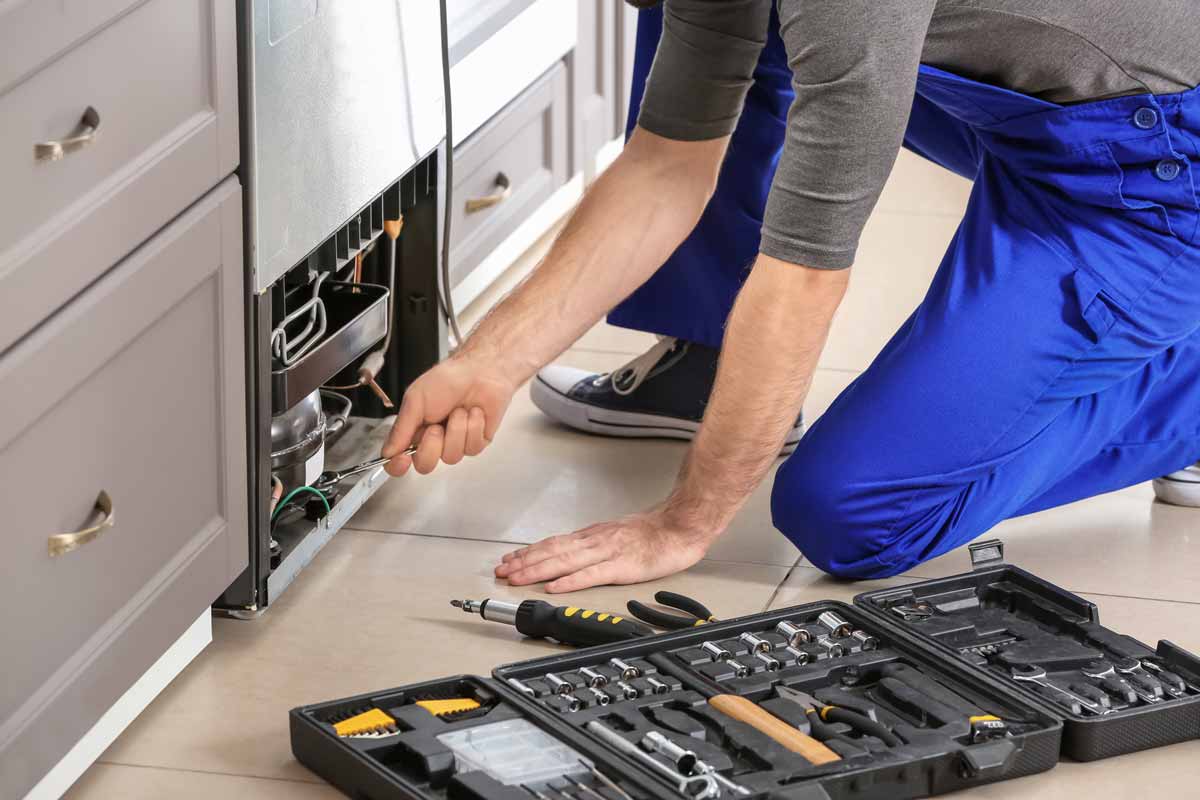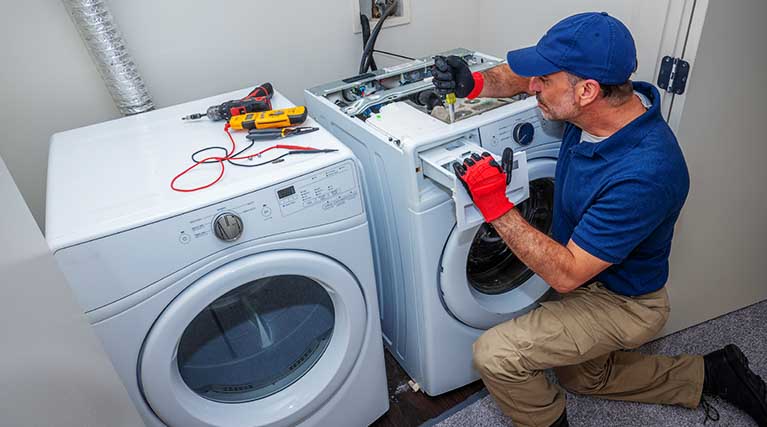Get Rid of Moldy Washer Smell – Maytag Washing machine repair Dependable Refrigeration & Appliance Repair Service
Get Rid of Moldy Washer Smell – Maytag Washing machine repair Dependable Refrigeration & Appliance Repair Service
Blog Article
The Ultimate Overview to Recognizing Device Repair Work in your home
When your fridge stops cooling or your oven refuses to warmth, it can really feel frustrating. Recognizing device repair work in the house can conserve you money and time. You'll learn to recognize signs, use necessary devices, and comply with an organized troubleshooting process. Prior to you begin, there are essential safety and security preventative measures you need to take into account. What are one of the most typical troubles, and just how can you fix them? Allow's explore the basics.
Usual Appliance Issues and Their Signs and symptoms
When your devices start breaking down, it's important to recognize the indications beforehand. Neglecting them can bring about bigger concerns and expensive repair services. If your refrigerator isn't cooling down properly, you might see cozy spots or condensation developing. This could show a stopping working compressor or a blocked vent.Your dishwasher might reveal problems through dirty dishes or uncommon sounds during cycles. If you hear grinding or clanking, it's time to investigate.A cleaning machine that won't spin or drain pipes can leave you with soaked washing, suggesting a clogged drainpipe or a malfunctioning pump.Lastly, if your oven's temperature appears off or it takes forever to pre-heat, you may be handling a damaged thermostat. By remaining sharp to these symptoms, you can resolve issues before they escalate into significant fixings.
Important Tools for Home Appliance Repair Work
When you're taking on home appliance repairs at home, having the right tools is crucial. Basic hand tools like screwdrivers and pliers will help you disassemble and deal with various appliances, while electrical screening devices assure you're working securely with electrical wiring. Let's discuss what you need to get going on your repair service trip.
Basic Hand Devices
Having the right tools is necessary for reliable appliance repair in your home. Begin with a dependable screwdriver set, including both flathead and Phillips kinds, as screws prevail in device setting up. Pliers are likewise essential; they assist with gripping, twisting, and reducing cables or little parts. A set of needle-nose pliers can get to difficult situations quickly. You'll need a good adjustable wrench for tightening or loosening up nuts and bolts. An energy knife is useful for cutting via packaging or insulation. Do not forget a tough workbench or surface area to safely organize your tools and components. With these basic hand tools, you'll be well-prepared to take on most home appliance repair work that come your way.
Electric Testing Instruments
Alongside fundamental hand tools, electric screening devices play a vital function in home appliance fixing. These tools assist you identify electric concerns and guarantee devices operate safely. A multimeter is crucial; it gauges voltage, current, and resistance, allowing you to identify problems quickly. A non-contact voltage tester is another essential, allowing you find live cables without making straight contact, improving your security. Secure meters are excellent for determining existing flow in cables without separating them, saving you time and initiative. In addition, circuit testers can quickly inspect if electrical outlets are operating properly. By using these devices, you'll enhance your troubleshooting procedure and improve your repair skills, making device maintenance a lot simpler.
Step-by-Step Guide to Diagnosing Home Appliance Issues
When your home appliance acts up, it can be aggravating, however identifying the problem doesn't have to be frustrating. You'll find out to identify usual troubles and use effective repairing strategies. Allow's go through the steps to get your appliance back in functioning order.
Common Home Appliance Issues

Troubleshooting Techniques Described

Repairing Significant Kitchen Devices: A Closer Look
Have you ever wondered how to tackle common concerns with your kitchen area appliances? Repairing significant kitchen area home appliances like fridges, ovens, and dishwashing machines can be simpler than you think. Start by recognizing the issue-- whether it's a fridge not cooling down or an oven that won't heat. Frequently, a straightforward reset or checking the source of power can fix the issue.For refrigerators, clean the condenser coils and check the door seals. If your oven's not heating, evaluate the burner and thermostat. Dishwashing machines might just require a tidy filter or a reset to obtain them back at work. Constantly disconnect the device prior to diving right into repairs to guarantee your safety.Don' t neglect to seek advice from the customer manual for particular troubleshooting ideas connected to your design. With a little patience and the right tools, you can with confidence tackle home appliance repairs and conserve cash at the same time!

Troubleshooting Laundry Equipments: Tips and Techniques
When your laundry appliances start acting up, it can feel overwhelming, however repairing them doesn't need to be a hassle. Start by examining the power supply. Verify the home appliance is connected in and the electrical outlet is operating. Next off, examine the door or lid button; a damaged button can protect against the maker from operating.For washers, if it's not spinning, look for out of balance loads. Rearranging the clothes could address the concern. If your clothes dryer isn't home heating, clean the dust filter and inspect the vent for blockages.Listen for unusual noises; they can suggest an issue. If your device is dripping, inspect the hose pipes for splits or loosened links. File any kind of error codes presented on electronic screens, as they can assist you in recognizing the concern. Get in touch with the customer handbook for details fixing pointers related to your design.
Security Preventative Measures to Take Throughout Repairs
Before you begin any home appliance repair work, it's necessary to focus on security to stop crashes or injuries. Disconnect the device or transform off the circuit breaker to guarantee no power reaches it while you function. Use protected devices to reduce the risk of electric shock. Put on security goggles and gloves to safeguard on your own from sharp edges or debris (Dependable Refrigeration & Appliance Repair Service Dryer repair near me).Make particular your office is tidy and well-lit, so you can see what you're doing. Keep kids and pet dogs away from the area to stay clear of diversions and prospective threats. If you're handling gas home appliances, be extra careful; check for leakages before proceeding.Take your time, and don't hurry via fixings. If you feel uncertain regarding any kind of step, it's much better to stop briefly and research than to guess. Adhering to these preventative measures will certainly assist create a more secure environment for your DIY appliance repair service job
When to Call a Professional for Assistance
Exactly how do you understand if it's time to employ a specialist for home appliance repairs? If you have actually tried basic get more info troubleshooting without success, it's a clear sign. For instance, if your home appliance still won't start or shows uncommon sounds after resetting it, do not wait to look for professional help.When you notice leaks, smoke, or melting scents, focus on safety and security and call a pro right away. These problems can lead to even more considerable damages or present threats to your home.Also, if your appliance is under guarantee, calling a professional is frequently the very best route. They can ensure that repairs will not invalidate your service warranty, conserving you money in the long run.Finally, if you're unsure or uncomfortable with complicated repair work, it's wise to leave it to the experts. Remember, taking on difficult issues without the appropriate knowledge can cause pricey errors. Count on a specialist when unsure!
Frequently Asked Inquiries
How Can I Protect Against Appliance Problems in the Future?
To avoid device troubles in the future, you must perform routine upkeep, look for wear and tear, clean filters, and avoid overloading. Staying proactive will certainly help expand their life expectancy and maintain them running smoothly.
What Are the Many Common Do It Yourself Device Repair Mistakes?
You may forget safety preventative measures, avoid repairing steps, or utilize inaccurate devices when attempting do it yourself appliance repair work. Hurrying the process or neglecting manufacturer guidelines can cause even more significant problems and expensive errors. Remain patient and informed!
Just how Do I Know if a Part Needs Replacement?
You can inform if a component requires substitute by looking for uncommon sounds, leaks, or inconsistent performance. If the home appliance has a hard time to operate properly or shows visible damages, it's most likely time for a substitute.
Can I Utilize Generic Components for Device Repair Works?
Yes, you can use generic components for appliance repair work, however ascertain they're suitable - Dependable Refrigeration & Appliance Repair Service Washer repair near me. Generic parts could conserve you cash, however they might affect efficiency or durability, so weigh your alternatives meticulously before choosing
What Service Warranties Cover Device Fixes?
Most device guarantees cover repair work for producing defects, however they typically exclude damage from abuse. Examine your guarantee terms carefully, as some could call for utilizing certified professionals and initial parts for coverage to remain valid.
Report this page